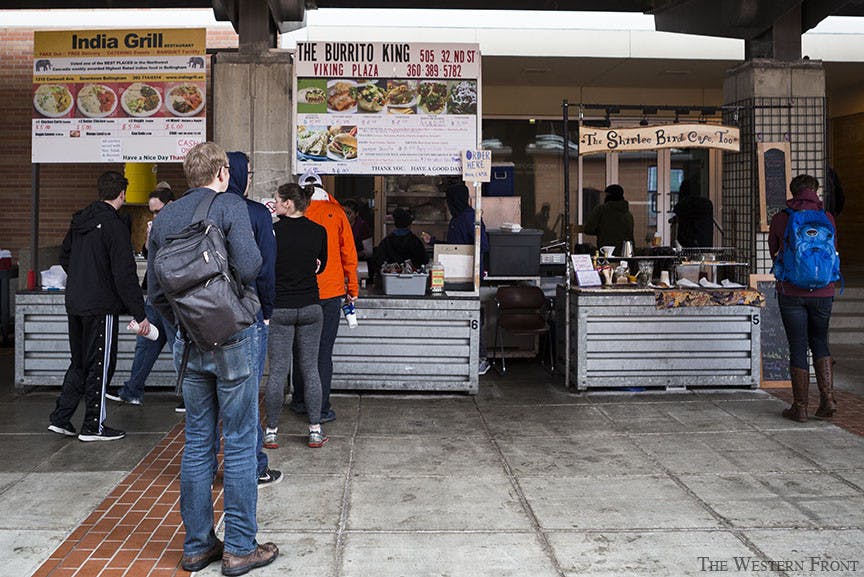By Jordan Kiel
With COVID-19 rapidly spreading, some restaurant owners at Western’s Vendor’s Row say they are worried about permanent effects on their business.
Ruben De La Garza, owner of Burrito King, has been a vendor for about 10 years and said Westen’s early closure due to COVID-19 affected his business. He said the Vendor’s Row location has been affected more than his Sunset Drive location or the food truck.
“[Western] is where we get the most of our business,” De La Garza said.
Burrito King has been taking extra safety precautions, washing their hands more frequently, De La Garza said. De La Garza is worried jobs may be lost, and Burrito King may be in danger of closing if Western operates online for a prolonged period. However, he is most worried about the safety of his customers and community.
James McCafferty, director for Western’s Center for Economic and Business Research, said it’s hard to tell how the food industry in Whatcom County is going to be affected. The impact of COVID-19 is localized and will be very different from Seattle to Whatcom County, McCafferty said.
“As a general population, not everyone reacts the same way,” McCafferty said. “If people are good at social distancing and hand washing, the effects will be minimized.”
McCafferty said Western’s early closure may be beneficial for restaurant owners at Vendor’s Row because it is less likely their workers will get sick.
QQ Li, owner of QQ Li’s, said she already closed her Vendor’s Row location but plans to re-open when possible. Li said she is personally not too worried. She has asked her employees to wash their hands more regularly and to wipe down tables and chairs with rubbing alcohol as the situation develops.
“I keep an eye on the news every day to be prepared,” Li said.
McCafferty said many businesses in the food industry are changing the way they operate in order to adapt to the spreading virus. For example, some restaurants are closing and becoming delivery-only businesses, while others have created drive-up service.
“It depends on how the business chooses to respond and how creative they get,” McCafferty said.
Sean Diamond, a second-year vocal performance major at Western, said he ate at Vendor’s Row about two times a week before COVID-19.
“It really hasn’t changed since the virus mostly because I know they wouldn’t be selling food if they weren’t safe,” Diamond said.
Diamond said in the week Western closed down classes, he saw very few people at Vendor’s Row.
“If Vendor’s Row closed down, I’d be a little disappointed, being that it’s cheaper to buy from them and usually it leaves me filled until I can go home and make dinner,” Diamond said.
The food and hospitality industries depend on a high density of people for their business, McCafferty said. If the hospitality industry is able to adapt for better social distancing, it may be able to combat some of the negative effects of the coronavirus.
People in Bellingham and Seattle are being encouraged to buy gift cards to support local businesses, but this solution would not work for Vendors Row.
“This is an opportunity for businesses as well as a challenge,” McCafferty said. “Not to sugarcoat it: Some businesses may not survive and some businesses may thrive.”
McCafferty said another reason why business in the food and hospitality industry may go down is because those are easy expenses for people to cut down on in order to save money.
“When Americans get nervous, they tend to save more,” McCafferty said. “It’s the uncertainty.”
Follow The Western Front on Facebook and Twitter for ongoing updates.






